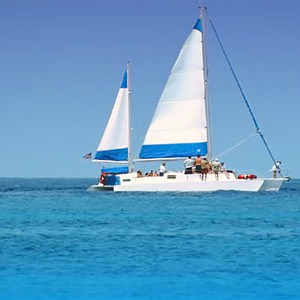Please Register / Login to take part in discussions about the Virgin Islands.
Just read of a few very disturbing incidents on STJ in the past few days. I wonder if anybody who's actually on the island has any sense of all this.
http://www.onepaper.com/stjohnvi/?v=d&i=&s=News:Local&p=1105687879
http://www.virginislandsdailynews.com/index.pl/article_home?id=8142365
I just returned from spending two months on beautiful St. John, and would like to say that while I certainly agree that the reported rape and arson were incredibly shocking and tragic, the most dangerous right thing right now is for people to blow the situation out of hand. Yes some terrible incidents took place, but this does not mean that island is a completely dangerous and unwelcoming place. It doesn't mean that tourists are unwelcoming or unsafe. There may be a minority of angry people on the island, but most are not. I was on St. John for the purpose of writing an anthropological paper about the affects of tourism (I certainly picked a relevant time to go) and most of the people I talked to didn't have a single bad thing to say about tourists . The island has some issues to address, but recent events are no reason to stop respectful, kind, and appreciative visitors from travelling to the island.
Just bumped into this log. I am a person of Afro-Caribbean descent. My mother's family is from St. John. Generations of St. Johnians. I spent many of my summers on St. John as a child and teenager. This I can tell you is not the St. John I grew up on. This is a St. John I don't recognize. Things have been brewing here for quite sometime and yes people seem to get along but there is an under tone of racisim on both sides.
However for the most part Virgin Islanders didn't a have a racist outlook until the islands were sold to the US. People forget that the islands were sold by Denmark, not the people. In those early years, people's housess were invaded, men drug out of their houses, beaten up, women raped and all sorts of wrong doings by the US Navy. But we were still told to smile and act right.
Since then we've been turning into "America' Playground/Paradise for the enjoyment of at that time Congressmen and people with means. This choice was not made by the people of the Virgin Islands. This choice was made by people who wanted the Virgin Islands as a place to escape to and still be under the U.S. flag.
The Virgin Islands are paradise, but people come here with their attitudes, assumptions and expectations without considering how the above affect the people who have lived and died here for generations. Yes there is resistance, but we should have a say in what happens in our home instead of people coming in and expecting us to act the way they are accustomed to.
Our government is complicit in the loss of land of St. Johnians. Many who have lost land underhandedly, have done so with the encouragement and at the urging of those who look like us. Even people in my own family which I am not proud of, but by default has contributed to some of the unrest among our own people. Our representatives for a long time and into the present do not protect us or our rights to our own land. Greed is rampant. Change must begin within.
As long as we are divided, we will continue to be destroyed. And their are those who are counting on that. Thanks for your time.
Peacelover,
Thank you for providing a thought provoking addition to this thread. Here are my thoughts about your remarks:
Arawak, Taino and Carib Indians were the most predominant groups of Native Americans originally inhabiting the islands of the West Indies (as well as Florida and coastal South America.) After whites arrived in what is now the USVI and "eliminated" the Indians, whites determined that they could make money off the land and "imported" African blacks to do the actual work. White Europeans were islanders before black Africans. Also, predominantly white nations, in the form of the United States, Denmark, Britain, France, Malta, Spain and Holland, have always "owned" the islands simply because African blacks were themselves the property of European whites and the concept of "island ownership" was never a part of Arawak, Taino or Carib Indian cultures. As an aside, since few people of pure Arawak, Taino or Carib descent exist and African blacks are no more "native islanders" than European whites it is unclear to me to whom "Our Islands, Our Home" license plates refer.
The economic status of white European islanders allowed them to leave when they finished exploiting the islands and tired of the novelty of island life while the economic reality for black African islanders was that they had no choice but to remain on island. Thus, many more contemporary black islanders than white islanders share a multi-generational island heritage. The fact that contemporary individual land ownership is overwhelmingly black on islands that have always and only been owned by predominantly white nations suggests to me that perhaps the problem isn't really racism but classism. There are island blacks that can afford to live as if the islands are "America's Playground" while other black islanders, especially those in service positions that cater to tourists (who are predominantly white,) struggle to imagine their lives are substantially better than life as a plantation grunt. To me, island tensions seem more a matter of economics than skin pigmentation.
All of this talk is simply not about what is really happening.
Get it straight folks...
Where would you rather be in the middle of the night..?.
New York City...Paris...Detroit...Los Angelos...?Lots of other places??? or in the Virgin Islands....
this is all...just stupid talk....If you listen to this crap...then...what can I say...
To "A little perspective is good,"
Sure, the Virgin Islands are safe for most people most of the time and the islands are generally safer than some parts of the large urban cities you mentioned but the Virgin Islands are as imperfect as anywhere else in the world. The degree of imperfection we live with is a matter of choice based on our understanding of our problems and our willingness to compromise to find solutions. Attempting to better understand each other requires us to honor our varied histories and respect our varied cultures and search for common ground upon which to collectively strengthen ourselves. This seems to me like the least "stupid talk" we can be doing...


